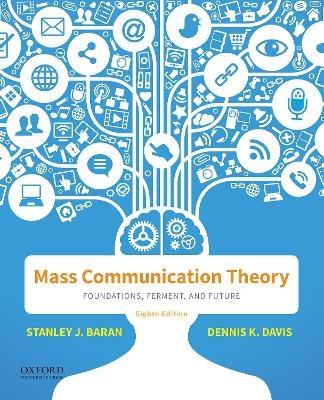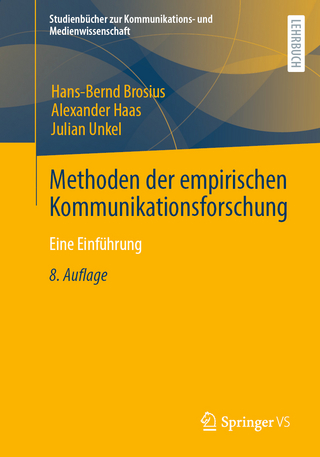
Mass Communication Theory
Oxford University Press Inc (Verlag)
978-0-19-094277-9 (ISBN)
Stanley J. Baran is Professor of Communication at Bryant University. He has won numerous teaching awards, including the AMOCO Teaching Excellence Award as the best instructor at the University of Texas at Austin and the College of Communication's Teaching Excellence Award as that college's outstanding professor. At San Jose State University he was named President's Scholar as the university's outstanding researcher. Dennis K. Davis is Professor Emeritus of Communication at Penn State University. His teaching and research center on mass communication theory, new media literacy, international communication, research methods, and political communication. He has headed divisions of the Association for Education in Journalism and Mass Communication and the National Communication Association.
Each chapter opens with Learning Objectives and an Overview and ends with a Review of Learning Objectives and Critical Thinking Questions.
Preface
Chapter 1. Understanding and Evaluating Mass Communication Theory
Defining and Redefining Mass Communication
Science and Human Behavior
Defining Theory
Postpositivist Theory
Cultural Theory
Critical Theory
Normative Theory
Evaluating Theory
Flexible Social Science
Mass Communication Theory
Four Trends in Media Theory
The Mass Society and Mass Culture Trend in Mass Communication Theory
The Media-Effects Trend in Mass Communication Theory
The Critical Cultural Trend in Mass Communication Theory
The Meaning-Making Trend in Mass Communication Theory
Revitalized Effects Research
Chapter 2. Establishing the Terms of the Debate over Media: The First Trend in Mass Communication Theory--Mass Society and Mass Culture Theories
Mass Society Critics and the Debate over Media
Assumptions of Mass Society Theory
Early Examples of Mass Society Theory
Gemeinschaft and Gesellschaft
Mechanical and Organic Solidarity
Mass Society Theory in Contemporary Times
The Origin of Propaganda
Propaganda Comes to the United States
Behaviorism
Freudianism
Harold Lasswell's Propaganda Theory
Walter Lippmann's Theory of Public Opinion Formation
Reaction against Early Propaganda Theory
Modern Propaganda Theory
Libertarianism Reborn and Challenged
Chapter 3. Normative Theories of Mass Communication
The Origin of Normative Theories of Media
The Origin of Libertarian Thought on Communication
The Marketplace of Ideas: A New Form of Radical Libertarianism
Government Regulation of Media
Professionalization of Journalism
Social Responsibility Theory of the Press: A Postwar Compromise
Using Social Responsibility Theory to Guide Professional Practice
Limits of Professionalization
The Dual Responsibility Model
Is There Still a Role for Social Responsibility Theory?
The Public Interest in the Internet Era
Other Normative Theories
Chapter 4. The Emergence of the Media-Effects Trend in Mass Communication Theory
The Development of the Postpositivist Effects Trend
From Propaganda Research to Attitude-Change Theories
Carl Hovland and the Experimental Section
The Communication Research Program
Do Mass Media Influence the Way People Vote?
The Strengths and Limitations of the Effects Trend in Media Research
The Selective Processes
Chapter 5. The Consolidation of the Media-Effects Trend
Theories of the Middle Range and the Rise of the Functional Analysis Approach
Information-Flow Theory
Personal Influence: The Two-Step Flow Theory
Joseph Klapper's Phenomenistic Theory
The Entertainment Function of Mass Media
Systems Theories of Communication Processes
The Rise of Systems Theories
Modeling Systems
Applying Systems Models to Human Communication
Adoption of Systems Models by Mass Communication Theorists
Functionalism's Unfulfilled Promise
Chapter 6. The Emergence of The Critical Cultural Trend in North America
Changing Times
The Critical Cultural Theory Trend
Macroscopic Versus Microscopic Theories
Critical Theory
Comparing the Media Theory Trends
The Rise of Cultural Theories in Europe
Marxist Theory
Neo-Marxism
Textual Analysis and Literary Criticism
The Frankfurt School
Development of Neo-Marxist Theory in Britain
Political Economy Theory
The Debate between Cultural Studies and Political Economy Theorists
Cultural Studies: Transmissional Versus Ritual Perspectives
Research on Popular Culture in the United States
Research on News Production in the United States
Critical Feminist Scholarship
Marshall McLuhan: The Medium is the Message and the Massage
Harold Innis: The Bias of Communication
McLuhan: Understanding Media
Chapter 7. Theories of Media and Social Learning
Focus on Children and Violence
Television Violence Theories
Catharsis
Social Learning Theory
Social Cognition from Mass Media
Aggressive Cues
The Context of Mediated Violence
Active Theory of Television Viewing
The Developmental Perspective
Video Games Reignite Interest in Media Violence
The General Aggression Model
Chapter 8. Theories of Media and Human Development
Media and Children's Development
Gender Issues
Advertising to Children
Loss of Childhood
Growing Up Connected: New Personal Technologies and Development
Social Media and Well-Being
Chapter 9. Audience Theories: Uses and Reception
Audience Theories: From Source-Dominated to Active-Audience Perspectives
Limitations of Early Audience-Centered Research
Confusion of Media Functions and Media Uses
Revival of the Uses-and-Gratifications Approach
The Active Audience Revisited
Entertainment Theory
Uses-and-Gratifications and Social Networking
Development of Reception Studies: Decoding and Sensemaking
Feminist Reception Studies
Chapter 10. Theories of Media Cognition and Information Processing
Information-Processing Theory
Processing Television News
Schema Theory
Hostile Media Effect
Elaboration Likelihood Model
Narrative Persuasion Theory and the Extended Elaboration Likelihood Model
Health Communication
The Delay Hypothesis
Affective Intelligence, Motivated Reasoners, and the Backfire Effect
The Neuroscience Perspective
Chapter 11. Theories of the Effect of Media on Knowledge, Information, and Perception of Social Issues
Knowledge Gaps, Digital Divides, and Digital Inequalities
Information (Innovation) Diffusion Theory
Social Marketing Theory
Agenda-Setting, Priming, and Agenda-Building
The Spiral of Silence
Chapter 12. Theories of the Effect of Media on Community And Everyday Culture
Media and Social Capital/Community Research
Cultivation Analysis
The Products of Cultivation Analysis
Media Literacy
Elements and Assumptions of Media Literacy
Media Literacy Interventions
Chapter 13. Media and Culture Theories: Meaning Making in the Social World
Symbolic Interactionism
Pragmatism and the Chicago School
Current Applications of Symbolic Interactionism
Social Constructionism
Framing and Frame Analysis
The Development of Theories of Frames and Framing
Effects of Frames on News Audiences
Postpositivist vs Critical Cultural Approaches to Framing
Chapter 14. Media and Culture Theories: Commodification of Culture and Mediatization
Media as Culture Industries: The Commodification of Culture
Commodification of Culture in the Age of Social Media
Advertising: The Ultimate Cultural Commodity
Mediatization Theory
References
Index
| Erscheinungsdatum | 17.01.2020 |
|---|---|
| Verlagsort | New York |
| Sprache | englisch |
| Maße | 191 x 234 mm |
| Gewicht | 771 g |
| Themenwelt | Sozialwissenschaften ► Kommunikation / Medien ► Kommunikationswissenschaft |
| ISBN-10 | 0-19-094277-0 / 0190942770 |
| ISBN-13 | 978-0-19-094277-9 / 9780190942779 |
| Zustand | Neuware |
| Informationen gemäß Produktsicherheitsverordnung (GPSR) | |
| Haben Sie eine Frage zum Produkt? |
aus dem Bereich


